Mesothelioma Symptoms
The most common mesothelioma symptoms are difficulty breathing, chest or back pain, persistent dry cough and muscle weakness. Symptoms also include fatigue, pleural effusion, fever and loss of appetite.
Written byKaren Selby, RN•Edited ByWalter Pacheco•Medically Reviewed ByDr. Jacques Fontaine
Asbestos.com is the nation’smost trustedmesothelioma resource
The Mesothelioma Center at Asbestos.com has provided patients and their loved ones the most updated and reliable information on mesothelioma and asbestos exposure since 2006.
Our team of Patient Advocates includes a medical doctor, a registered nurse, health services administrators, veterans, VA-accredited Claims Agents, an oncology patient navigator and hospice care expert. Their combined expertise means we help any mesothelioma patient or loved one through every step of their cancer journey.
More than 30 contributors, including mesothelioma doctors, survivors, health care professionals and other experts, have peer-reviewed our website and written unique research-driven articles to ensure you get the highest-quality medical and health information.
About The Mesothelioma Center at Asbestos.com
- Assisting mesothelioma patients and their loved ones since 2006.
- Helps more than 50% of mesothelioma patients diagnosed annually in the U.S.
- A+ rating from the Better Business Bureau.
- 5-star reviewed mesothelioma and support organization.
Testimonials
My family has only the highest compliment for the assistance and support that we received from The Mesothelioma Center. This is a staff of compassionate and knowledgeable individuals who respect what your family is experiencing and who go the extra mile to make an unfortunate diagnosis less stressful. Information and assistance were provided by The Mesothelioma Center at no cost to our family.LashawnMesothelioma patient’s daughter
How to Cite Asbestos.com’s Article
APA
Selby, K. (2023, September 25).Mesothelioma Symptoms.Asbestos.com. Retrieved October 11, 2023, from //www.magnakarsa.com/mesothelioma/symptoms/
MLA
Selby, Karen. "Mesothelioma Symptoms."Asbestos.com, 25 Sep 2023, //www.magnakarsa.com/mesothelioma/symptoms/.
Chicago
Selby, Karen. "Mesothelioma Symptoms." Asbestos.com. Last modified September 25, 2023. //www.magnakarsa.com/mesothelioma/symptoms/.
What Are the Symptoms of Mesothelioma?
Pleural effusion is the most commonmesotheliomasymptom. It occurs in 90% of cases because this cancer often develops in the chest. “Most commonly, patients present with cough, shortness of breath, difficulty in walking and loss of stamina,” saidDr. Marcelo DaSilva, chief of thoracic surgery and medical director at AdventHealth Cancer Institute.
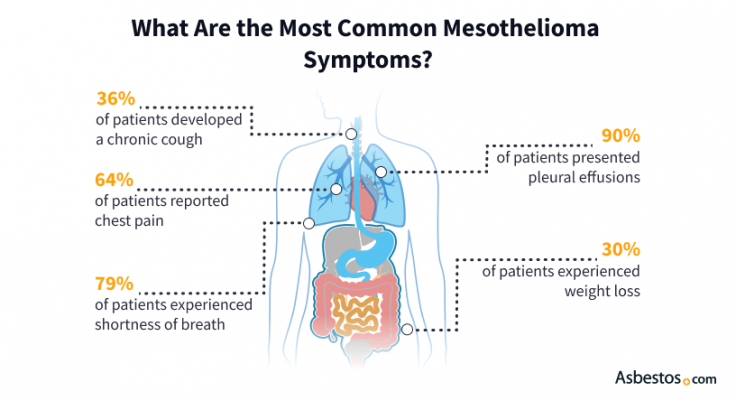
的症状间皮瘤可以取决于the type and location of the cancer. Common mesothelioma symptoms include fatigue, chest pain, fever, loss of appetite, accumulation of fluid in the chest (pleural effusion), shortness of breath and swelling.
Pleural Mesothelioma Symptoms
Pleural mesotheliomaforms on the soft tissue lining the outer lung. The most common symptoms of pleural mesothelioma are:
- Chest pain or discomfort
- Difficulty swallowing
- Dry, persistent cough
- Hoarseness
- Lower back pain
- Muscle weakness
- Shortness of breath
- Swelling of the face and arms
Pleural plaques or scar tissue are early and common signs of asbestos exposure. These plaques lead to pleural thickening and stiffening. As the pleural space becomes less flexible, the lungs expand less during breathing.
“Many oncologists, primary care providers and even pulmonologists don’t realize that a pleural effusion or shortness of breath and pain could be mesothelioma because it is so rare,”Dr. Jeffrey Velotta, a cardiothoracic surgeon at Kaiser Permanente, told The Mesothelioma Center.
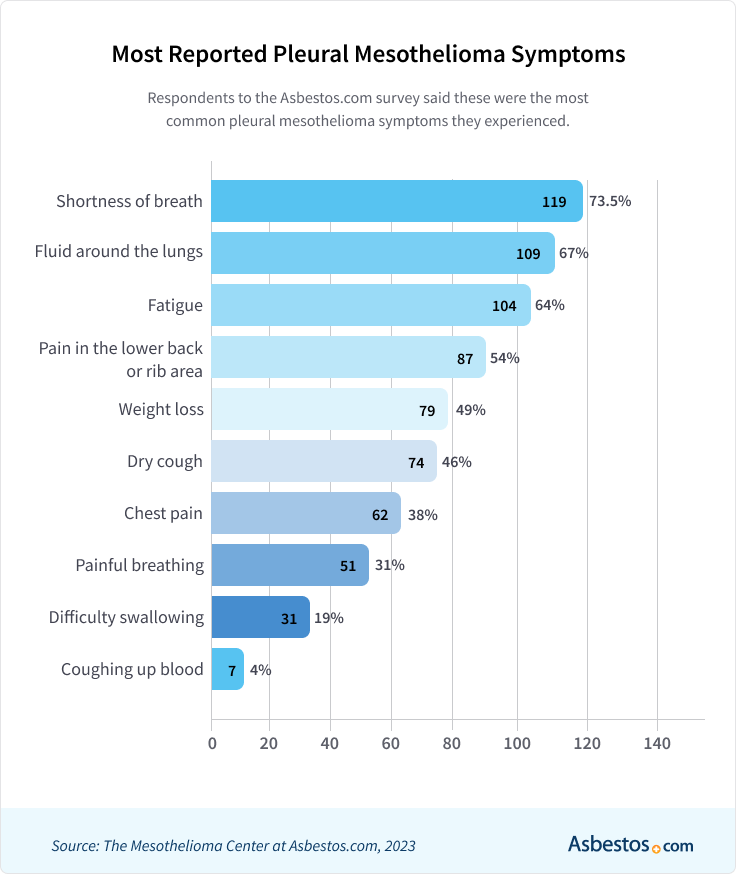
Early symptom management leads to improvedlife expectancy. Informing your doctor of your symptoms and asbestos history is vital to cancer management.
“We must let [doctors] know what symptoms to look for,” Velotta said. “If they know what to look for, they can refer patients to mesothelioma specialists.”
Peritoneal Mesothelioma Symptoms
Peritoneal mesotheliomadevelops on the soft tissue that lines the abdominal cavity and organs. Signs and symptoms of peritoneal mesothelioma are:
- Abdominal fluid buildup (ascites)
- Abdominal pain
- Abdominal swelling
- Constipation
- Loss of appetite
- Nausea and vomiting
- Unexplained weight loss
Fluid buildup in the abdomen is the most common sign of asbestos cancer in the gut. As tumors form in this region they can cause bloating, pain, diarrhea and constipation.
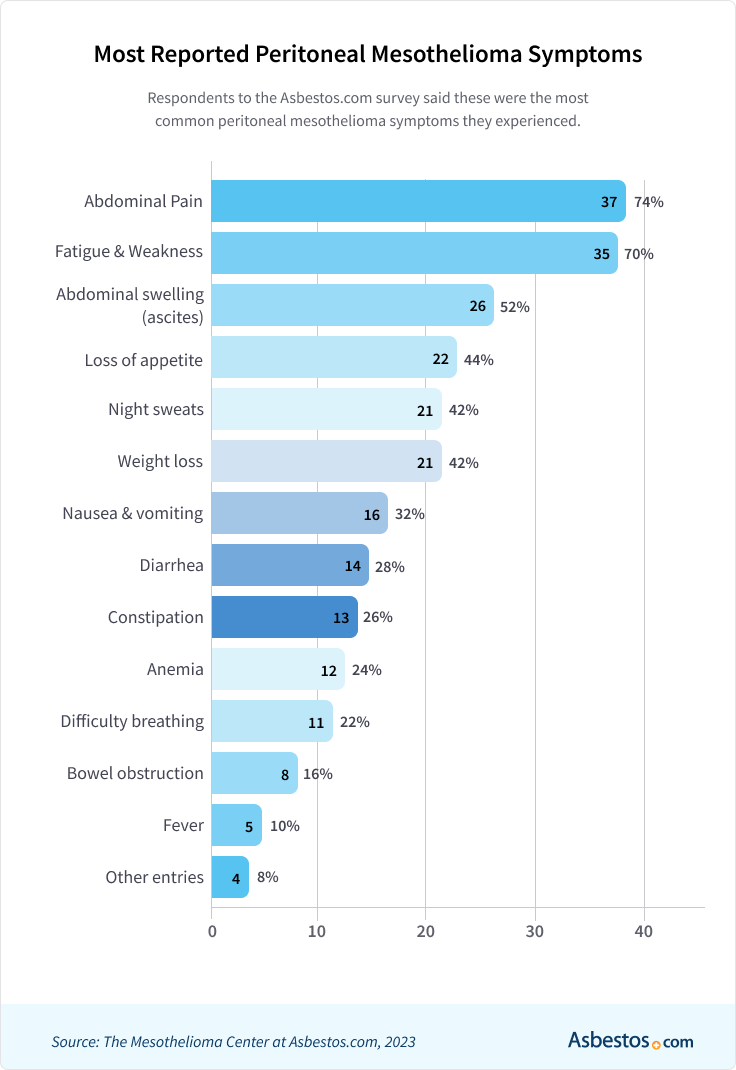
“我开始感到轻微的不适上abdominal area,” peritoneal mesothelioma survivorKasie Colemantold The Mesothelioma Center when she was diagnosed in 2010. “My family practitioner said I had probably bruised a rib.”
Seven months later, “the pain was back with a vengeance. I could hardly stand,” Coleman said.
Coleman spent nearly two years with persistent and worsening symptoms because of misdiagnosis. She experienced fluid in the abdomen and extreme pain until she underwent hernia surgery. At that time, doctors found a mass and confirmed her peritoneal mesothelioma diagnosis.
Pericardial Mesothelioma Symptoms
Pericardial mesotheliomadevelops in the pericardium, the lining around the heart. Symptoms of pericardial mesothelioma may include:
- Chest pain
- Difficulty breathing (dyspnea)
- Heart murmurs
- Heart palpitations or irregular heartbeat (arrhythmia)
- Shortness of breath
Pericardial mesothelioma is one of the rarest forms of this cancer. Symptoms appear when the heart sac starts to thicken. The condition makes it harder for the heart to pump blood.
Testicular Mesothelioma Symptoms
Early signs oftesticular mesotheliomamay feel like a groin injury or other illnesses. A common symptom is inflammation of the testes. This condition can look like epididymitis. Common symptoms of testicular mesothelioma may include:
- Hydrocele (fluid in the scrotum)
- Lump in the scrotum
- Swollen testes
- Testicular pain
A lump in the testes is the most common sign of testicular mesothelioma. This is the rarest of all types of mesothelioma. It accounts for less than 1% of all mesothelioma cases.
Rare but Serious Signs and Symptoms of Mesothelioma
Some symptoms of mesothelioma may be less noticeable, such as weight loss, but these are no less dangerous. You may have anemia with pale skin, cold extremities or dizziness. Fewer than 10% of patients experience fever or night sweats.
- Anemia
- Blood clots
- Fever
- Night sweats
- Painful swelling or lumps
- Weight loss
Pleural mesothelioma patients have a higher risk of developing blood clots. Signs of blood clots include redness, pain and swelling on one side. You may also notice strange lumps under the skin. Pleural patients may have pain or swelling along the sides of the chest. Peritoneal patients may see this around the abdomen.
Understanding all these signs can preventmisdiagnosisor delayed cancerdiagnosis. The Patient Advocates at The Mesothelioma Center at Asbestos.com have talked to thousands of patients and families. Their stories consistently highlight the importance of finding a mesothelioma specialist as soon as symptoms appear.
Many symptoms may feel or look like less severe conditions. If you worked with asbestos or products containing asbestos, you have ahigher risk of mesothelioma. When you recognize symptoms, make an appointment with amesothelioma doctoror general health care provider. Early treatment is more effective in slowing your cancer and improving your survival.

When Should I See a Doctor?
If you have ever been near asbestos, pay attention to your symptoms. Many could correlate to mesothelioma or other asbestos-related illnesses. Also, watch for rare signs, such as fever, weight loss or anemia.
See a doctor immediately if you have chest pain, abdominal pain or other symptoms. This is especially important if you have a history of asbestos exposure. Early detection of mesothelioma can improve treatment outcomes. It is vital not to ignore symptoms or delay seeking medical attention.
Early and Late Stage Symptoms of Mesothelioma
Symptoms of mesothelioma will increase as cancer spreads ormetastasizesfrom the early to late stages. Tumors that develop on distant organs can cause more damage by affecting the diaphragm, cardiac lining or liver.
Early Symptoms of Mesothelioma (Stage 1 and 2)
In stage 1 pleural mesothelioma, the cancer is in the lining of one lung or the chest wall. It remains localized to the same side of the body as the initial tumor. Stage 2 tumors have begun to spread beyond their origin.
“Chest pain can indicate that the tumor has invaded the chest wall,” Dr. DaSilva told The Mesothelioma Center.
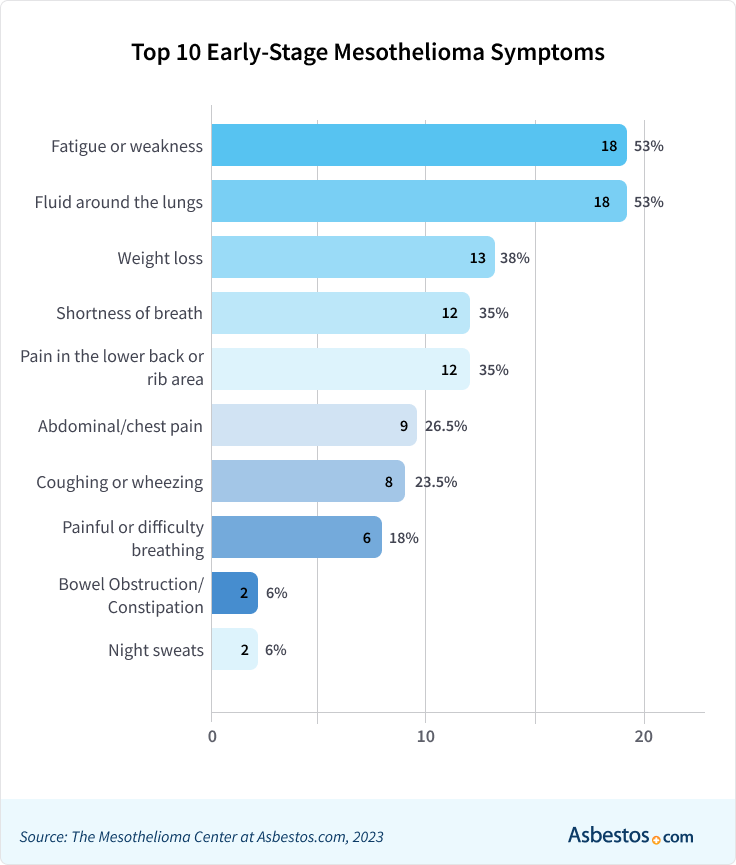
- Chest or abdominal pain
- Coughing or wheezing
- Fatigue or weakness
- Shortness of breath
Early-stage mesotheliomarefers to stages 1 and 2 of the disease. During this time, the cancer is localized and has not yet spread to distant body parts. Most patients have no symptoms during these stages.
Late Stage Symptoms of Mesthelioma (Stage 3 and 4)
As cancer progresses in stages 3 and 4, orlate-stage mesothelioma, tumors go deeper into tissues. Symptoms become more noticeable. Cancer cells may spread throughout the body. You may experience less control due to pain, weakness or breathing difficulty. Caregiving at these stages becomes more challenging.
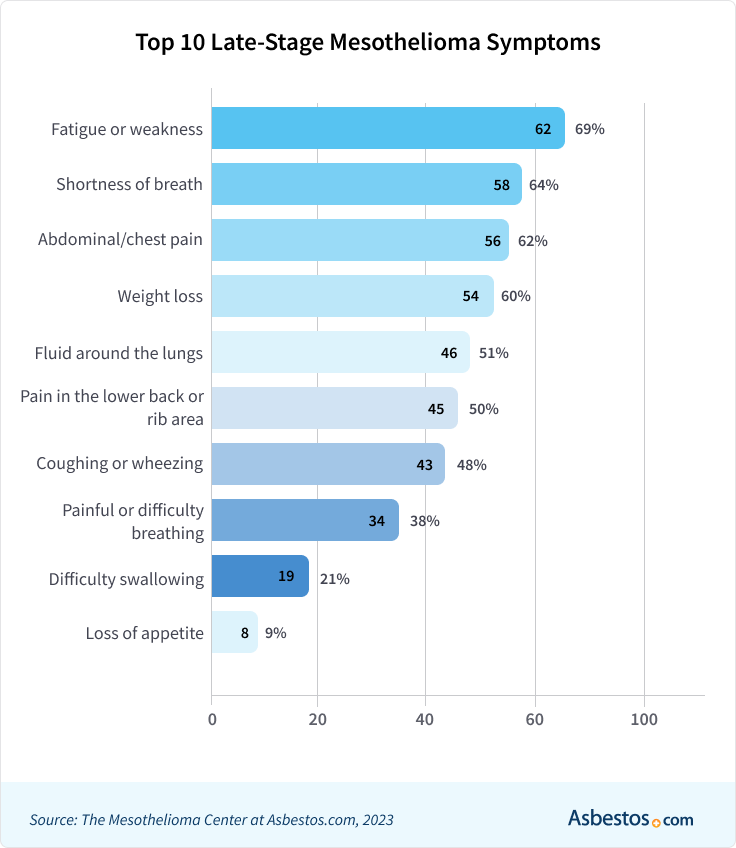
- Anemia and associated fatigue
- Bowel obstruction
- Difficulty swallowing
- Fever or night sweats
- Loss of appetite
- Respiratory complications
- Severe or persistent pain
- Weight loss
Fever can be a sign that the body is fighting cancer cells. It is also a common side effect of cancer treatments and may signal an infection. Chemotherapy weakens the immune system. The treatment leaves patients more vulnerable to viruses and bacteria. For caregivers, food safety and personal hygiene become critical at these stages.

Treatment Options for Mesothelioma Symptoms
Therapies that treat symptoms of mesothelioma include surgery, chemotherapy, immunotherapy and radiation therapy. Targeted or gene therapy may also be effective. The Patient Advocate team at The Mesothelioma Center notes that patients have concerns about treatment side effects. Many worry they may be as bad or worse than their current symptoms.

Patient AdvocateDr. Snehal Smartshared that mesothelioma patients often ask her, “Will chemo or immunotherapy infusions make me sicker than what I am already feeling?” Duringtreatment, side effects can limit your daily activities. A good treatment plan, including pain management, will take into account your health and specific symptoms.
Mesothelioma Palliative Care
Palliative carecan help ease severe pain, shortness of breath and fatigue. It also addresses patients’ and families’ physical, emotional and spiritual needs. It can improve your quality of life and allow you to perform more activities you enjoy.
- Medication
- Physical and occupational therapy
- Pleurodesis
- Respiratory therapy
- Thoracentesis
“Patients want to know how long they will have to go through treatment,” noted VA-accredited claims agent and Patient AdvocateDanielle DiPietro. “Surgical patients are concerned about whether it is ‘worth it,’ and their quality of life after surgery.”
Pain Management for Mesothelioma Symptoms
Mesothelioma can cause significant pain and discomfort. Pain medications can address neuropathic, bone and visceral pain.
- Adjuvant medications
- Nonsteroidal anti-inflammatory drugs, called NSAIDs
- Opioids
“Patients are sometimes challenged with taking pain medication as they worry about becoming addicted,” said registered nurse and Patient Advocate Karen Selby.
Consulting with a pain management specialist is the best way to ease concerns about pain medication.
Alternative Therapies for Mesothelioma Symptoms
互补的技术可以帮助管理和疼痛improve stress alongside standard treatment. These options should not replace traditional cancer care.
- Massage
- Physical therapy
- Relaxation
柔和的锻炼和activitiessuch as mild yoga or meditation are often helpful. Try to avoid activities or positions that worsen the pain.
Nutrition and General Health for Every Stage of Mesothelioma Symptoms
Good nutrition is a vital concern for mesothelioma patients. A healthy diet helps the immune system. It can also increase energy levels. You may have a low appetite, nausea, vomiting or trouble swallowing during treatment.
- Avoid foods labeled as low-fat, nonfat and low-calorie.
- Eat protein-rich foods regularly.
- Work with a registered dietitian to create a tailored nutrition plan.
“Losing the desire to eat is extremely common,” registered and licensed dietitianTejal Parekhexplained. “Several changes can cause this, including the stress of a diagnosis, the treatment and the side effects or pain that the tumor causes. Excess weight loss can lead to delayed healing after surgery and longer recovery between chemo cycles.”
Supportive Therapies for Emotional and Psychological Effects
Supportive therapies help patients and families cope with mesothelioma’s emotional and psychological effects. Patients may experience a range of emotions. They may feel fear, anxiety and depression.
- Mental health counseling
- Support groups
Support groups and organizations can provide a sense of community, emotional support and a safe space for patients.
Common Questions About Mesothelioma Symptoms
- When do mesothelioma symptoms start?
-
Mesothelioma symptoms tend to present between 20 and 60 years after asbestos exposure. This delay is known as the latency period. The signs also mimic many common diseases. These factors make a mesothelioma diagnosis challenging for unspecialized doctors.
- Can you have mesothelioma and not know it?
-
Yes, you may have mesothelioma without any symptoms. Many mesothelioma symptoms are mild and mimic the flu or a stomach virus. Most only appear decades after asbestos exposure. Doctors may also misdiagnose this rare cancer as other illnesses, delaying your mesothelioma diagnosis.
- What are the early warning signs of mesothelioma?
-
Early signs of pleural mesothelioma include a dry, persistent cough and shortness of breath. Some patients may have nausea, constipation or diarrhea with peritoneal cancer. Every patient is different. Talk to your doctor as soon as you notice any changes to your health.
- Can mesothelioma symptoms come on suddenly?
-
Yes, some mesothelioma symptoms may occur suddenly. Some patients do not experience symptoms until the cancer has spread to another organ, such as the kidneys or liver. The cancer location determines the type and severity of symptoms you may have.










